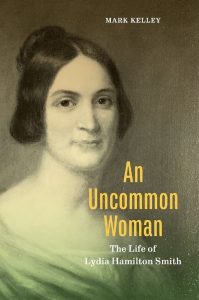Book Review: An Uncommon Woman: The Life of Lydia Hamilton Smith

 An Uncommon Woman: The Life of Lydia Hamilton Smith. By Mark Kelley. University Park: PA: The Pennsylvania State University Press, 2023. Softcover, 280 pp. $24.95.
An Uncommon Woman: The Life of Lydia Hamilton Smith. By Mark Kelley. University Park: PA: The Pennsylvania State University Press, 2023. Softcover, 280 pp. $24.95.
Reviewed by Tim Talbott
At the close of Steven Spielberg’s motion picture Lincoln, a cane-dependent, limping, club-footed Thaddeus Stevens (played by Tommy Lee Jones) takes the official copy of the 13th Amendment to the Constitution from the House clerk with the promise that he will bring it back “in the morning creased but unharmed.” Stevens, the Radical Republican congressman who helped push the amendment though, walks his way to his Washington D.C. domicile where he receives greetings by his resident woman of color housekeeper Lydia Hamilton Smith (played by S. Epatha Merkerson). Stevens hands the copy to Smith with the words: “A gift for you.” The scene then switches to Stevens’ bedroom, showing him getting into bed next to Smith who is reading the amendment. He says he wishes she could have been there, and she said she wished she would have, but followed with, “You can’t bring your housekeeper to the House. I won’t give them gossip. This is enough, this is more than enough for now.” And they kiss.
This scene is likely most people’s introduction to Lydia Hamilton Smith. And many people probably left the theaters wanting to know more about this woman. It is admittedly where author Mark Kelley first learned about Smith, and it is what prompted him to research and write his recently published biography of her titled An Uncommon Woman: The Life of Lydia Hamilton Smith.
Despite Lydia Smith’s connections to one of the most important politicians of the mid-19th Century, not much previous scholarship existed about her to work from. While several biographies cover the anti-slavery egalitarian Stevens, many of them have little to say about the woman who was by his side as his housekeeper, confidante, Underground Railroad co-collaborator, caregiver, and probably romantic companion for almost the last 25 years of his life. For example, Stevens’ most recent biography, Thaddeus Stevens: Civil War Revolutionary, Fighter for Racial Justice by Bruce Levine (Simon and Schuster, 2021), says that “the two [Stevens and Smith] developed a close friendship and working relationship.” But other than a photograph of Smith, according to the index, that is the only mention of her in the book. Kelley on the other hand, clearly shows just how much of an influence Smith was on Stevens, and how her talents, skills, and work ethic enabled him to accomplish the sea change legal and political achievements he is remembered for. But much more than that, Smith life is worthy of its own biography.
Kelley’s research into Smith’s life is both deep and broad. He seemingly leaves no stone unturned in his quest to reveal her story, which at times is dangerous and heartbreaking—particularly in her family life, and at other times triumphant in her accomplishments and inspiring in her perseverance for justice. Kelley makes astute use of virtually everything available, including a diversity of Adams and Lancaster County, Pennsylvania, records; Stevens’ Library of Congress Papers; a wide range of newspapers; as well as numerous published works dating back to his period of investigation to the present.
In telling Lydia Smith’s story through the evidence he discovered, Kelley shows her at times as an extremely compassionate woman. She cares for her troubled alcoholic son; she gives years to Stevens’ healthcare when he was unable to do so himself and unwilling for anyone other than Smith to do so; and she attends numerous times to Stevens’ nephew, Civil War veteran Thaddeus Stevens, Jr., when his alcoholism leaves his life in a mess. But Kelley’s research and writing also reveals a woman who is a meticulous record keeper, has a mind for business and property investments, knows how to deal with people despite her mixed-race second-class citizen status, is strong and not gullible, and is persistent in her efforts to claims what was rightfully owed to her.
A number of photographs and illustrations of people, places, and events throughout the book add to the story that Kelley tells. A photograph of Smith in her later years, as well as painted portrait of her earlier in womanhood that also graces the book’s cover, help readers connect with Smith during the various stages of her life.
Well researched and written, and telling a dramatic and important life story, readers interested in 19th Century gender and race issues are sure to find An Uncommon Woman: The Life of Lydia Hamilton Smith an important contribution to Civil War-era scholarship, and a book well worth reading and adding to their library.
Very interesting subject matter and seems to be a person we need to know more about. I too was intrigued as to who she was when I saw the Lincoln movie. Well done for raising our awareness and I hope the book does well.
Thank you, Tim. You summarizd the book better than I could. I appreciate your interest in and appreciation for this inspiring woman. Best, Mark Kelley (author of An Uncommon Woman)